This is the extraordinary autobiographical story of Ali Ahmed Ismail Vohra, a highly educated engineer employed by the Railways who meticulously chronicled his story preceding, during and following the Partition of India in 1947. Taken from the extensive autobiography of his personal experiences and family history spans from 1750-1986 and encapsulates his personal journey and that of his ancestry, telling a narrative of communities that underwent a profound transformation of identity, loss and belonging. Through his thorough documentation, Vohra has provided us with an invaluable record of history.
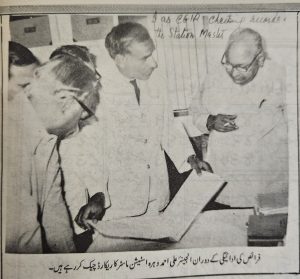
This is his ‘ Partition’ story, in his words.
I was a strong Muslim Leaguer, finally leaving India to move to “Final” Pakistan. It was vital I left India before 14th August as thereafter, Muslims would be butchered like goats. General Raja Prashad Hazaribagh said, “Vohra Saheb, you do not know what I know”. Consequent happenings in East Punjab and elsewhere proved he was right.
I had anxiety that time was short, as I had to report my transfer before 14th August 1947. While still recessing at Hazaribagh after return from leave, I received telegraphic orders from E.I. Railway, Calcutta, in the first week of August. Due to the lack of time, the General Manager called his P.A to dictate a letter of confirmation that the Director Railway Board agreed to my transfer to N.W. Railway in Lahore. After much uncertainty and waiting, I collected my railway passes, loaded the wagons safely and journeyed to Lahore with break stops at Asansol and Hazaribagh railway stations.
After being discharged from Hazaribagh on 12th August 1947, I made my way to Lahore in a First-Class Compartment with Major Khan, he too destined for Lahore. We reached Lahore late after sunset on 13th August 1947.
The journey near and at Amritsar was eventful. From the villages in East Punjab on both sides of the railway track, Muslim men and women were running, and people were boarding the carriages. “We are Muslims from adjourning villages, and the police and army had started looting our property, shooting us. We must leave everything behind. We must run for our lives.” We were offered our four-berth compartment, and every conceivable portion was occupied, even the bathroom. There was no luggage, no belongings, just people on the roof, holding dearly to the footboard, inside people stood like sardines.
We were informed that the enemy would not permit the train to reach Lahore safely, so we were instructed to close all the shutters. We had to endure the suffocating heat if we wanted to survive. Major Khan had his rifle, a double barrel and revolver, loaded. We planned for the both of us to stand with our guns behind closed doors so if a mob attacked us, we were prepared.
The excursion to Amritsar opened our eyes to columns of thick smoke coming from burning houses, multitudes of fleeing Muslim masses, each with lost families and stories of voyage and loss waiting to be uttered.
It was a while until the train left. Major Khan bought news that the Muslim driver of the train demanded armed police protection, but this was not permitted. We sent him with our loaded revolver, with word that it was soon sunset, so we left for Lahore Railway Station, 35 miles away. Our train arrived at Lahore on 13th August 1947 with a large occupancy of Muslim refugees. We later learnt that our train was the last to reach Lahore safely.
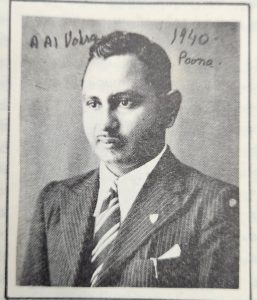
I was informed by the Station Superintendent that “The railway stations were bombed, so the Baluch Regiment has taken over, and they are shooting the suspected enemies, forget about your luggage. Take shelter in the refreshment room as first-class is at capacity with passengers standing; you are fat and may be easily mistaken as a non-Muslim. So, sir, save yourself!”
Throughout my journey, Allah took me out of various predicaments. From being left with no money to having my luggage paid for and arranged, finding trunks and bedding lying unloaded and sleeping safely on the train platform, to reaching the last train to Lahore safely, I was saved. There was not a single soul on the platform, just lifeless bodies.
I left Lahore with two other Railway Officers, Rizvi A. and Moin Khan. At around 10:30 pm, the Karachi Express would be leaving for Karachi. Luggage was picked up, no passes or tickets were required, and the guard instructed all the lights of the compartments to be switched off and the wooden shutters lowered. There were pockets of people near Raiwind and Montgomery, now Sahiwal. Peeping through, I saw men with swords on the platform. This was to be midnight of 14th August 1947, the day that declared Pakistan a Muslim-majority area.
We arrived at Multan to what was now born as Pakistan. I discovered Multan had a Railway Divisional HQ and was a safe Muslim-majority area. Therefore, I saw no reason to proceed to Karachi. I was delighted to find the station master, and his staff were there to receive me at my compartment. They were expecting me and kept a room! A rest house was near the platform, and they had stored water for a bath in the tub, much needed for the blistering heat of August. That fateful morning was 14th August 1947, coinciding with the 27th night of Ramadan. Qaid-E-Azam, Muhammad Ali Jinnah, had been sworn in as the Governor General of the Independent State of Pakistan by the outgoing Viceroy of India, Lord Mountbatten.
From the R.M.S office on the platform, I purchased a postcard and wrote to my brother Ibrahim at Kanjari about the horrific experience I had at both Lahore and Amritsar. It somehow reached my family, and they were worried as my subsequent letters did not reach me for over four months. I wrote to my mother in Han. My family thankfully learnt of my welfare after about four months from my cousin Ismail Kapurwala. He migrated to Karachi, and on his visit to Bombay at the end of 1947, he published the news of my well-being in a Muslim Weekly paper, “Muslim Gujrat” of Surat City.
14th August was declared a public holiday to celebrate the newly found independence of Pakistan. However, all celebrations were cancelled in respect of the Muslim massacre of East Punjab. I went to the office of the Divisional Superintendent to stroll, introducing myself to Mr A. A. Shah. He remarked, ‘Vohra means you come from Bombay side’ and asked me to recall my eyewitness account of my experience. Although my posting order showed Malakwal, I was suggested to stay at Multan in the Rest House for a few days due to the absence of trains and lack of safety. After about six days, the D.S. called for me and I was issued the railway pass.
Malakwal Town was safe and quiet for Muslims and non-Muslims then, Hindus and Sikhs. Soon, the Muslim refugee caravans started reaching Lahore from India, where the Pakistan Government dispersed them by goods trains to various locations. Some were destined for Sargodha, Pind Dadan Khan and Khusab via Malakwal. I formed a committee along with dedicated railway staff and leading Muslims of the town to look after the refugees, breakfast/lunch/dinner/ medical necessities. There was an overwhelming response; people cooked food on the platform and served it to the refugees stopping at the platform for as long as required.
Reflecting on their predicament, Muslim sentiment and anger were stirred, and pitched fights and riots started between Muslims and the rest, the latter having strong arms and fortified houses. Consequently, the military arrived, escorting non-Muslims to a safe place and sending them ‘off by goods train’ and ‘not afoot’ as was the case in India. For the non-Muslims, a magistrate was appointed to manage their property. He stayed in the railway rest house under my charge and beside my bungalow. He kindly offered furniture and household effects, but I refused and awaited my kit/personals- wagons from India. Again, without locks, they arrived safely.
The Giridih (coal) supply cut-off led to reduced train services between the newly formed India and Pakistan, for the train engines were coal-fired. The situation became so dire that trains had weekly schedules. This continued until an alternate source was located, arranged from foreign countries, and some engine converted their boilers to ‘oil firing’. For the first time in 1951, Pakistan’s railways introduced diesel engines. Most of any proposed railway projects were saved for ‘better days’ due to financial stringency. Even maintenance and replacement works were held off, and this condition continued for years.

As I reached Karachi from Malakwal, I found that flights were booked well in advance, mostly by Sindhi Hindus leaving the country for Bombay. I somehow got a seat in a specially chartered place. As the place took off, the passengers clad in shalwar kamis and ‘Jinnah caps’ threw the caps on the floor, and it was only then I realised the plane was chartered by Sindhi Hindus. At Santacruz airport, an Indian Assistant Superintendent of Police entered the place to inquire about this particular flight of passengers who objected to Pakistan’s Government. We were permitted to leave off the plane after.
Mr Rabbani, a West Pakistan Railway Officer, arranged an 8-persons first-class cabin in a steamer that would leave Bombay for Karachi. Upon receiving so, I left for my hometown Kanjari and left for Bombay with my mother, wife, three sons, two brothers and nephew. That very evening, through Gujrat Mail, we learned that Gandhi was assassinated and thankfully still managed to reach Bombay Central Hail the next morning. As expected, riots pursued, and the city observed strikes. I rang up the Muslim League and salute them, for they sent a microbus to the station, where we were provided with a special room. The building and even verandas were filled to the brim with transfer Muslim Government servants and their families awaiting transportation. We left by steamer to Karachi, enjoying the sea journey in first class. We then took the train in first class to Malakwal via Karachi, and I resumed duty there on 11th February 1948.
A few months later, the Indian and Pakistani governments introduced a ‘Permit system for travellers between the two countries.’ My sister Mariam and brother-in-law Adambhai requested that we return our nephew Usman Ghani to her, ensuring he’s not permanently held up in Pakistan. My mother and I also decided to keep Ghulam Nabi, my brother, with me; he was not so academically driven. My mother, nephew Usman, and brother Mohammadbhai returned to India on the Railway pass via first class through the only railway link open between the two countries: Hyderabad-Khokhropar-Marwar-Allahabad.
One night in August 1948 saw an excessive unprecedented down-pour of unimaginable sixteen inches of rain, ripping up parts of the railway line, bridges carrying away sectioned girders piers being uprooted. There were no eyewitnesses when this occurred at night, but it became a dry hilly stream by the morning. On our visit from Karachi, I inspected the damage as much as possible with A.E.N. and my son Mohammad Ali. Our train underwent a caution order reaching Khushab after crossing the Demont Morancy Railway bridge over the river Jhelum, and so we quickly retreated, fearing the overflow may damage the railway line just about holding up our train. The three of us left for Malakwal, and soon, the rising water washed away a 6-foot arch bridge near Pakhowal Railway station, so we sent messages to Rawalpindi to further inspect the damages. A decision from a higher level was made after the damage inspection. The C.EN. Lahore was personally asked to visit the site and come to a conclusion. Hesitantly, the decision to temporarily restore the track was made.
Ali Ahmad Ismail Vohra’s comprehensive works have undoubtedly transcended their status from a personal story to a monumental piece of history, supporting the understanding of generations to come of pre, during and post-1947. The impact of his work is a legacy, a testament to the power of personal narratives shaping the course of history itself.
Background
Ali Ahmed Ismail Vohra was born in 1915, in Kanjari, India. Ismail Vohra had three brothers, six elder sisters and seven stepsiblings, all taught at ‘The Vernacular Gujrati School’ run by the British Government. After completing his fifth vernacular, Vohra was required to travel by train to the CIU or Nadiad to learn English. He spoke both English and Urdu exceptionally well.
As a child, Vohra regularly tended to the fields with his mother, Aishabai Hajiani, to weed the young crop and carry greens for the animals in monsoon and the household. This was a practice very safe for women, not at all considered below dignity for doing one’s own jobs; nay, they were respected. He recalls an upbringing where Muslim villages had Hindu barbers, a profession by caste, who visited every Friday. Vohra also remembers the gradual use of tea leaves, and soon, a traditional breakfast turned from Bajra roti and buffalo milk to Bajra roti and tea. His father, Ismail, was a God-fearing man, very religious and offered his five daily prayers and recited Qur’an. His modest upbringing taught that no beggar would go back empty-handed.
His educational career started in 1920, concluding with a double Degree of B.E. (Elect) and B.E. (Mech). He also received a religious education under the guidance of a Maulvi. After numerous examinations and studies in Mechanical and Electrical Engineering, Applied Higher Maths and Astronomy, Vohra accepted an offer conveyed through a letter dated 1st September 1943 that he would be reporting for duty on Monday 6th September 1943. Thus, he began his Railway Engineering career. He went on to be one of the named engineers responsible for the Ayub Bridge, which crosses the River Indus.
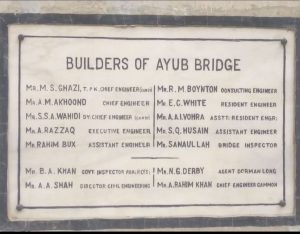
Edited by Saarah Ahmed
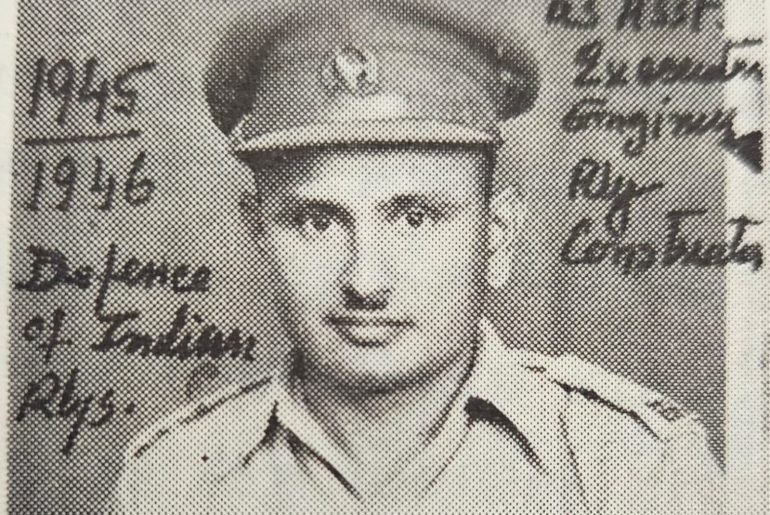
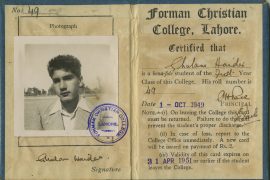
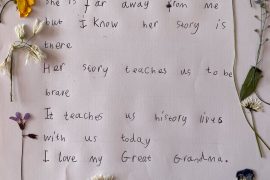
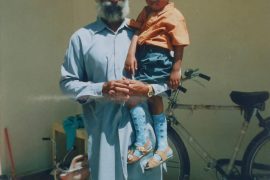
Comments are closed.